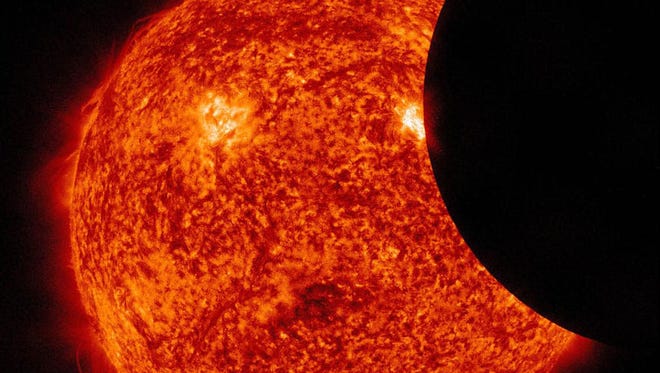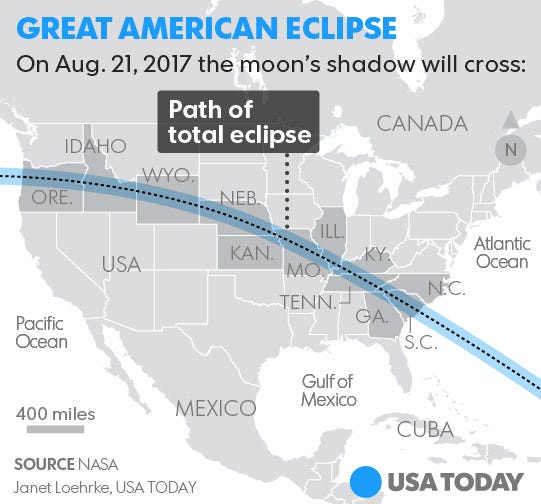5 things to do now to prepare for the solar eclipse

NASHVILLE — The solar eclipse is coming!
On Aug. 21, day literally turns to night as the moon completely blocks the sun for about two minutes.
This is the ultimate in "free" experiences.
And by all accounts a total solar eclipse is "awesome," in every sense of the word.
While the entire United States will see a partial eclipse, 35 counties in Tennessee are set to experience the eclipse in totality. Nashville is among the largest American city in the 70-mile wide path of the total eclipse.
More:200 million people are within just one day's drive of the solar eclipse. What you need to know
It will be the first total eclipse visible only in the United States since the country was founded in 1776.
Here are five things to do now to get ready for the Aug. 21 total solar eclipse:
1. Decide where to be
If you live in Nashville or surrounding areas and are in the path of totality, the experts say to stay at your house and watch from there. But Rocky Alvey, director of Vanderbilt University Dyer Observatory, said to be absolutely sure that your location is within the line of the total eclipse. "The saddest thing would be to expect to see it in totality and realize you are a mile off the line."
More:10 best places to see this summer’s solar eclipse
The eclipse also will pass directly over cities such as Salem, Ore.; Idaho Falls; Lincoln, Neb.; Kansas City; and Columbia and Charleston, S.C.
If your house is not in the path, consider traveling. Places within a one- or two-hour drive of the eclipse include Portland, Ore.; Boise; Cheyenne, Wyo.; Rapid City, S.D.; Omaha; Topeka; St. Louis; Louisville; Knoxville, Chattanooga, Tenn.; Atlanta; and Charlotte.
NASA has a map to check your location.

2. Stock up on safety glasses to watch the eclipse
"Never, ever, look directly at the sun with just your eyes," said Theo Wellington, former president of the Barnard Seyfert Astronomical Society and currently a volunteer NASA Solar System ambassador. She cautioned you need eye protection from special glasses to directly view the progression of the eclipse.
"At totality, for the short time the sun is completely covered, you can safely look without the glasses, because during that short time, you are looking at the moon," Wellington said. But when the first speck of light reappears, put the glasses back on.
Looking directly at the sun can cause severe damage — even burning and blindness — to your eyes. Sunglasses will not do the trick. Wellington said to make sure glasses meet the government's ISO standards.
3. Don't bother with a telescope
Just enjoy the wonder of viewing the eclipse and don't worry about a telescope.
"There is nothing like it, it is almost a life changing experience," said Alvey, who also discouraged trying to capture the eclipse by taking pictures. "There will be millions of pictures of it that you can get," he said.
More:Awesome new eclipse Forever stamp morphs when you touch it
Wellington agreed: "Just as no picture of the Grand Canyon you have ever seen didn't convey the size, the beauty, the sheer magnitude of the canyon, so too no image does the sight justice." She also noted that telescopes need special solar filters. "Never point an unfiltered telescope or binoculars at the sun."
4. Do your homework
"Read up on what to expect," Wellington said. "For most of us, this is our first total solar eclipse. Many of us have seen partials ... which are cool, but nothing compared to totality."
There are lots of programs and several recommended websites offering eclipse information, including Vanderbilt University's Dyer Observatory, NASA and Great American Eclipse.
5. Plan an eclipse party
"Plan a party around the eclipse," Alvey said. Although the eclipse totality event itself is a minute or two in most spots, the partial eclipse leading up to it and winding down afterward could be a couple of hours, which is plenty of time for a lunch party, he said.
"Ask for the day off," Wellington said. "... This is not a geeky science event. This is a human event. You don't need to be a geologist to enjoy the beautiful western canyons and mountains. You do not need to be an astronomer to enjoy an eclipse. This is one of the great natural wonders, enjoy the view," she said.
Contributing: Doyle Rice, USA TODAY. Follow Mary Hance on Twitter: @Ms_Cheap
